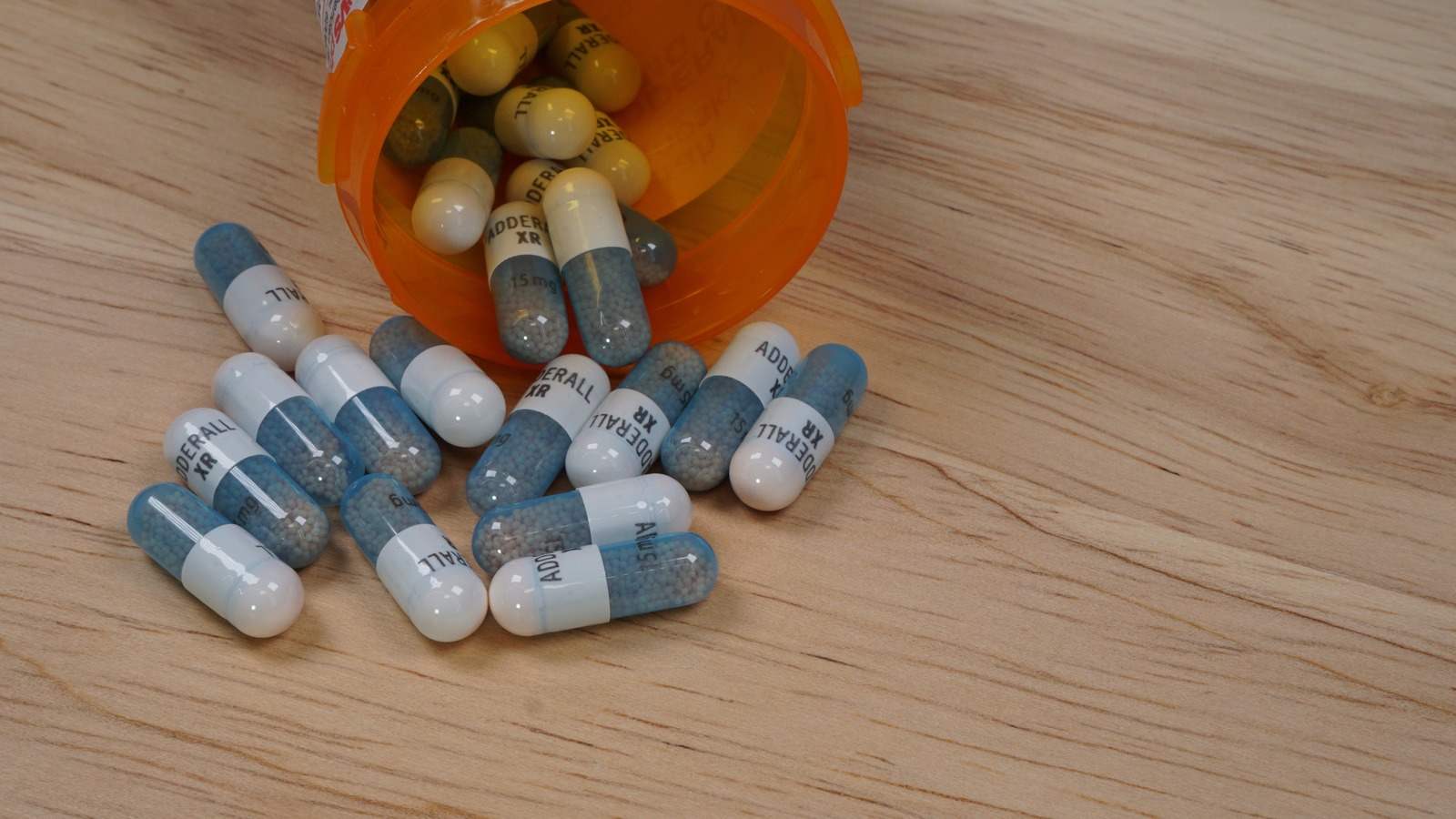Adderall Dosage for Adults: Considerations and Guidelines

What you will learn
- Dosage recommendations for Adderall typically start low and may be adjusted gradually based on individual response, with a maximum daily limit.
- Prescribed starting dosages may vary outside the typical range, necessitating adherence to healthcare provider instructions and open communication about concerns.
- Factors such as medical history, treatment goals, and individual response inform Adderall dosage determination, emphasizing the importance of regular monitoring and adjustment.
- Misuse of Adderall can lead to several consequences, underscoring the importance of using it responsibly and seeking help if needed.
- Accessing comprehensive care for stimulant abuse involves seeking support from healthcare professionals and considering a range of treatment options tailored to individual needs, offering hope for recovery and long-term sobriety.
Adderall, a commonly prescribed medication for conditions like attention deficit hyperactivity disorder (ADHD), can provide significant therapeutic benefits when used correctly.[1] Deciding on the appropriate dosage of Adderall for adults involves carefully considering various factors, including your medical history, your response to the medication, and your intended treatment goals in collaboration with your prescriber.
What is Adderall, and How Does it Work?
Adderall is a prescription medication composed of active ingredients amphetamine and dextroamphetamine, both of which are controlled substances and central nervous system stimulants.[2] These stimulants work by affecting the levels of neurotransmitters in the brain and increasing their activity. As an FDA-approved treatment for narcolepsy, Adderall helps to improve focus, attention span, and impulse control in individuals with ADHD.
Adderall alleviates symptoms by enhancing concentration, reducing impulsivity, and controlling hyperactivity. By modulating dopamine and norepinephrine levels in specific brain regions responsible for attention and executive function, Adderall enables individuals to regulate their behavior better and engage in tasks requiring sustained focus and cognitive effort. Moreover, Adderall has been shown to increase activity in brain regions associated with attention and cognitive control, further supporting its efficacy in managing ADHD symptoms.
What Are the General Dosage Recommendations for Adults?
The general dosage recommendations for Adderall in adults typically depend on the condition being treated and individual response to the medication. For ADHD, the initial daily dose for adults is often 5 mg once or twice daily.[3]
The healthcare provider may gradually adjust this dose based on the individual’s response and tolerance, typically increasing by 5-10 mg at weekly intervals until the optimal dose is reached. The maximum recommended dose for ADHD in adults is usually 40 mg per day.
For narcolepsy, the usual starting dose of Adderall for adults is 5 or 10 mg once daily in the morning.[4] Similar to ADHD treatment, the dose may be adjusted gradually based on response and tolerance, with increments of 5 or 10 mg at weekly intervals. The maximum dose for narcolepsy in adults is often 60 mg per day.
Individuals prescribed Adderall should follow their healthcare provider’s instructions carefully and not exceed the recommended dosage. Adjustments to the dose should only be made under the supervision of a healthcare professional to ensure safety and effectiveness.
Additionally, the duration of treatment may vary depending on the condition being treated and individual response, so it’s essential to regularly communicate with your healthcare provider to evaluate treatment progress and make any necessary adjustments.
What if I’m Prescribed a Dosage of Adderall Outside This Range?
If you are prescribed a dosage of Adderall that falls outside the typical range mentioned, it’s important to follow your healthcare provider’s instructions still carefully. Healthcare providers may sometimes prescribe dosages higher or lower than the standard range to address your specific needs and circumstances best.
If your prescribed dosage of Adderall differs from the general recommendations, your healthcare provider will likely explain the rationale behind the decision and discuss any potential risks or benefits associated with the dosage. It’s essential to communicate openly with your healthcare provider about any concerns or questions regarding your medication regimen, including dosage adjustments.
How is the Dosage for Adderall Determined?

The dosage for Adderall is determined based on several factors, including the condition being treated, the individual’s age, weight, medical history, and response to the medication. Healthcare providers typically start with a low dose and adjust it gradually to achieve the desired therapeutic effect while minimizing common side effects.[5]
For conditions like ADHD, healthcare providers may begin with a low dose and titrate upwards based on the individual’s response. They may consider factors such as the severity of symptoms, the individual’s age, and any coexisting medical conditions. The goal is to find the lowest effective dose that provides symptom relief with minimal side effects.
Similarly, for narcolepsy, healthcare providers may start with a conservative dose and adjust it based on the individual’s response and tolerance. They may also consider factors such as the severity of daytime sleepiness and other sleep disorders.
Regular monitoring and communication between the individual and their healthcare provider are essential throughout treatment. This allows for adjustments to the dosage as needed and ensures that the medication remains effective and well-tolerated over time.
What Are the Dangers of Misusing Adderall?
Misusing Adderall can pose several dangers to both physical and mental health. Some of the potential risks associated with Adderall misuse include:[6]
- Legal and social consequences: Using Adderall without a prescription or for non-medical purposes is illegal and can result in legal consequences, including fines, penalties, or criminal charges. Additionally, misusing Adderall can strain relationships, impact academic or occupational performance, and lead to social isolation or alienation.
- Cardiovascular effects of Adderall: Adderall is a stimulant medication that can increase heart rate and blood pressure. Misusing Adderall, especially at high doses or for non-medical purposes, can lead to cardiovascular complications such as palpitations, arrhythmias, hypertension, and an increased risk of heart attack or stroke.
- Psychological effects: Misusing Adderall can also impact mental health and cognitive function. It may exacerbate existing psychiatric conditions or trigger new ones, such as anxiety disorders, mood disorders, or psychotic episodes. Prolonged misuse may also lead to tolerance, dependence, and addiction.
- Physical health risks: Chronic misuse of Adderall can have adverse effects on physical health. It may disrupt sleep patterns, suppress appetite, and lead to weight loss, malnutrition, and dehydration. Long-term misuse can also contribute to gastrointestinal issues, headaches, and other physical symptoms.
- Nervous system overstimulation: Adderall stimulates the central nervous system, which can lead to overstimulation when misused. This may manifest as agitation, restlessness, anxiety, paranoia, hallucinations, or even seizures in severe cases.
If you or someone you know is struggling with Adderall misuse, seeking help from a healthcare provider or addiction specialist is crucial for addressing the problem and preventing further harm.
How to Get Help for Stimulant Abuse
If you or someone you know is struggling with a stimulant addiction, seeking help is essential for recovery and overall well-being. Start by contacting a healthcare professional or a mental health provider who can assess your situation and recommend an appropriate SUD program. This may include outpatient counseling, support groups, residential treatment programs, and medication-assisted treatment, depending on the severity of the abuse and individual needs.
Accessing a full spectrum of care ensures comprehensive support tailored to your journey toward recovery, providing the resources and guidance necessary to overcome stimulant abuse and achieve long-term sobriety. Remember, recovery is possible with the right support and commitment.
Our Frederick addiction treatment guide will give you more information about our programs which are customized to meet your individual needs, ensuring you receive the best possible care. Contact us today to learn more about how we can support you on your recovery journey.
Ready to get help for you or a loved one? Contact us
To ensure accuracy and quality, every contributor to the Alpas Wellness resource library undergoes a thorough evaluation of their experience, credentials, and achievements prior to publication.
Frequently Asked Questions About Adderall and Stimulant Abuse
How can I safely stop using Adderall if I’m addicted?
If you’re addicted to Adderall, it’s crucial to seek professional help for safe cessation. Abruptly stopping Adderall can lead to withdrawal symptoms, including fatigue, depression, and anxiety. A healthcare provider can develop a tapering schedule to gradually reduce your dosage while managing withdrawal symptoms and providing support throughout the process.
What should I do if I suspect someone is abusing Adderall?
If you suspect someone is abusing Adderall, it’s essential to express your concerns in a supportive and non-judgmental manner. Encourage them to seek help from a healthcare professional or addiction specialist. Offer to assist them in finding resources for treatment and support, and emphasize your willingness to be there for them throughout their recovery journey.
What are the warning signs of a stimulant overdose?
Warning signs of a stimulant overdose include rapid heartbeat, high blood pressure, agitation, confusion, hallucinations, seizures, and loss of consciousness. If you suspect someone is experiencing a stimulant overdose, seek emergency medical attention immediately. Prompt intervention is crucial to prevent serious complications or death.
Can you become tolerant of Adderall over time?
Yes, tolerance to Adderall can develop with prolonged use. This means that over time, individuals may require higher doses of Adderall to achieve the same effects they experienced initially.
Tolerance can increase the risk of dependence and addiction, highlighting the importance of using Adderall as prescribed and under medical supervision. If you notice that your prescribed dose of Adderall is becoming less effective, consult your healthcare provider to discuss potential adjustments to your treatment plan.
Dextroamphetamine And Amphetamine (Oral Route) Description and Brand Names – Mayo Clinic. (2020). Mayoclinic.org. https://www.mayoclinic.org/drugs-supplements/dextroamphetamine-and-amphetamine-oral-route/description/drg-20071758 on April 24, 2024
Dextroamphetamine and Amphetamine: MedlinePlus Drug Information. (2023). Medlineplus.gov. https://medlineplus.gov/druginfo/meds/a601234.html on April 24, 2024
Stimulant and Related Medications: U.S. Food and Drug Administration-Approved Indications and Dosages for Use in Adults. (n.d.). https://www.cms.gov/Medicare-Medicaid-Coordination/Fraud-Prevention/Medicaid-Integrity-Education/Pharmacy-Education-Materials/Downloads/stim-adult-dosingchart11-14.pdf on April 24, 2024
Abad, V., & Guilleminault, C. (2017). New developments in the management of narcolepsy. Nature and Science of Sleep, Volume 9, 39–57. https://doi.org/10.2147/nss.s103467 on April 24, 2024
Taylor, E. (2019). ADHD Medication in the Longer Term. Zeitschrift Für Kinder- Und Jugendpsychiatrie Und Psychotherapie, 47(6), 542–546. https://doi.org/10.1024/1422-4917/a000664 on April 24, 2024
Warning: Abuse, misuse, and addiction – accessdata.fda.gov. (n.d.). https://www.accessdata.fda.gov/drugsatfda_docs/label/2023/011522s045lbl.pdf on April 24, 2024